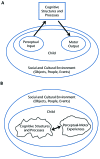Grounding early intervention: physical therapy cannot just be about motor skills anymore
- PMID: 23001524
- PMCID: PMC3538987
- DOI: 10.2522/ptj.20120158
Grounding early intervention: physical therapy cannot just be about motor skills anymore
Abstract
This perspective article provides support for 4 interrelated tenets: grounded perceptual-motor experience within cultural and social contexts forms cognition; exploration through early behaviors, such as object interaction, sitting, and locomotion, broadly facilitates development; infants and children with limited exploration are at risk for global developmental impairments; and early interventions targeting exploratory behaviors may be feasible and effective at advancing a range of abilities across developmental domains and time. These tenets emphasize that through the promotion of early perceptual-motor behaviors, broader, more global developmental advancements can be facilitated and future delays can be minimized across domains for infants and children with special needs. Researchers, educators, and clinicians should build on these tenets to further demonstrate the effectiveness of targeted early interventions. The goals of these interventions should be not only to advance targeted perceptual-motor skills in the moment but also to more broadly advance future abilities and meet the early intervention goal of maximizing children's learning potential.
Figures


References
-
- Radford L. The ethics of being and knowing: towards a cultural theory of learning. In: Schubring G, Seeger F. Semiotics in Mathematics Education: Epistemology, History, Classroom, and Culture. Rotterdam, the Netherlands: Sense Publishers; 2008:215–234
-
- Thelen E. Grounded in the world: developmental origins of the embodied mind. Infancy. 2000;1:3–28 - PubMed
-
- Campos JJ, Anderson DI, Barbu-Roth MA, et al. Travel broadens the mind. Infancy. 2000;1:149–219 - PubMed
-
- Lobo MA, Galloway JC. Enhanced handling and positioning in early infancy advances development throughout the first year. Child Dev. 2012;83:1290–1302 - PubMed
-
- Gabriel MAM, Alonso CRP, Bertolo JD, et al. Age of sitting unsupported and independent walking in very low birth weight preterm infants with normal motor development at 2 years. Acta Paediatr. 2009;98:1815–1821 - PubMed
Publication types
MeSH terms
Grants and funding
LinkOut - more resources
Full Text Sources
Other Literature Sources
Medical

